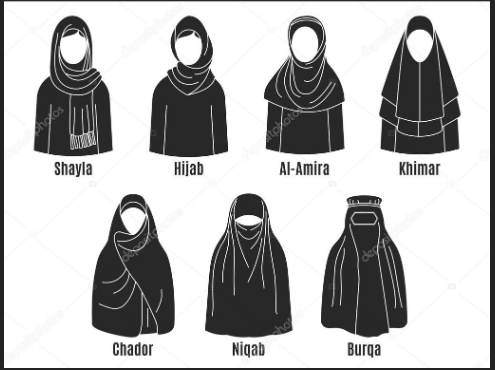Let’s clear one thing out from the beginning. This blog is not about banning women from wearing the veil. Freedom of religion necessitates that people are able to practice their religion the way they are required to. They are free to make religious decisions, even if those decisions are stupid, so long as they are personal, do not interfere in other people’s lives and are not harmful to members of society.

This blog is also not about the false equivalence between veiled women and the so-called “scantily” clad women. There is no equivalence. Yes, women should dress whichever way they want but while — for the most part — choosing to wear less clothes IS actually a personal decision, choosing to wear the veil is another matter.
Which is why I want to talk about agency. When veiled Muslim women are criticised for espousing ridiculous views about patriarchy, i.e. that there is none and that they are free and it is their choice to wear the veil, we are told that we are undermining their agency with our criticism. That they are independent, free women, who have the right to wear the veil. Again, let me reiterate, I am not arguing against their right to wear it. They absolutely have the right to wear it as far as governmental regulations should be concerned.
Coming to this mythical agency everyone keeps mentioning, which basically is the capacity or ability to make a decision and enacting that decision on society. I understand that as being able to exert power on your little corner of the world.
Muslim women do not wear a veil because it is an expression of freedom or a fashion choice. They wear it because they are required to do so as per religion. If they do not, it is a sin and anything bad that may happen to them is their fault, because they are fair game.
From the outset, we can see that much of their agency has been depleted. If they want to be good Muslim women, and go to heaven (although this is also disputable as, apparently, women are going to be a minority in heaven since most are going to hell Sahih Bukhari 7:62:124, Sahih Muslim 36:6596, Sahih Muslim 36:6601), they should cover themselves up appropriately. In this instance, religion undermines the agency.
Now why do I think the veil is the cornerstone of patriarchy? Because it is. Women of respectable families were required to cover themselves long before the advent of Islam, which continued this custom. Believing women are required to cover themselves, so as to not bring dishonour on their fathers, brothers, husbands. Only permitted men are allowed to look at their hair etc. Therefore, the honour of fathers, brothers, and husbands dictates how a woman may dress when she is with other men.
When only certain men are allowed to look at “their women”, said women are property and must be protected as such; by being wrapped up. Which is why the defense of hijab and niqab is given with protecting your lollypop and juicebox (your property) from flies (other men) analogies.
If you dig deep into the bedrock of this, it is clear. This agency is very limited. That is how patriarchy and religion have modernised themselves: by inventing the myth of the agency of women, especially veiled women. It has told them that they are making a choice, and have the freedom to exert that choice. This has been religion — and by extension — patriarchy’s greatest trick: convincing women that they have agency.
To me, their freedom is just like that of mice in a maze that I read in The Handmaid’s Tale, which are free to go anywhere, so long as they remain inside the maze. And that is the extent of agency veiled woman have.
